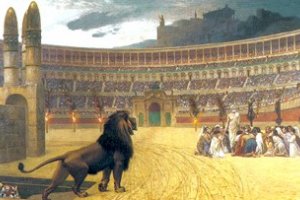

Our Holy Faith - One of Many?
by Joseph Sheppard
|
If one were to ask the average US citizen how they would feel about our country becoming a truly Christian nation, with only Catholic leaders and Catholic judges, how would they respond? More likely than not, they would probably complain that such a nation would be unjust and unfair to the other "faiths," or those who had no faith at all. If the typical American Catholic were asked the same question, their answer would probably be the same.
This laissez-faire attitude toward false religions is prevalent in Europe as well. In fact, in every country influenced by what we historically refer to as "western civilization," we find a great sympathy and more than tolerant attitude toward non-Christian beliefs. How ironic that the progeny of Christian Civilization should be content with assigning the Church that Our Lord founded to the status of one among many.
Certainly, the Muslim nations of the Middle East do not exercise such tolerance in regard to other religions, and they are often unabashed theocracies. While our courts reject the display of God's Commandments on government property, Muslim countries forbid the presence of Bibles. While the countries of the new European Union deny their Christian roots, Muslim immigrants flood Europe and new mosques are erected. Our leaders refer to the "peace-loving" Muslims while Catholic missionaries and their converts are butchered in Africa by Muslims.
Why do we see such a lopsided picture of religious tolerance on a world-wide scale? Why is it that Muslims can be so confident in their beliefs as to violently impose their will on others, while Christians are ashamed of the very notion of a Christian nation? Most people are indignant when the concept of a Catholic nation, regardless of its form of government, is mentioned. Such a concept is considered anachronistic, unenlightened and intolerable. Even a brief study of history illustrates that this was not always the situation. Christian Europe fought unceasingly against the invasion of Muslims. From Charles Martel's victory at Poitiers in 732, to the defeat of the Turks at the battle of Lepanto in 1571, we have glorious examples of the defense of Christendom. The life-blood of the martyrs, the seeds of the Church, was not spent to acknowledge tolerance of all religions. Fr. Laux, writing on the Roman persecutions in his Church History, states this well:
"The Christians were at once the objects of hatred and contempt. Because they were intolerant of all other religions, because they either denied outright the existence of heathen deities or regarded them as evil spirits whose worship was the greatest sacrilege and treason to the true God - they were called narrow-minded bigots" 1 (My emphasis)
What would these early Christians and martyrs think of the contemporary Church and the current false ecumenism? There is little doubt that the examples given by our modern Shepherds at pan-religious ceremonies has contributed to an abhorrence of truly Catholic nations.
Another cause of this pan-religious spirit is the premise that a government should not favor any particular religion. By this admission one has already determined that all religions are equally bad, good, or of no consequence. What is in reality important to governments that adopt such an attitude is that the State's laws and power come first. This was often the attitude of the Roman leaders until after the Edict of Milan (313 AD). As Fr. Laux puts it:
"The Roman Government persecuted the Christians not merely in order to humor the populace, but from reasons of State. The Roman and the Christian conceptions of the State were diametrically opposed. The Romans believed in the absolute authority of the State and in its right to pass laws on any subject it chose, even in matters of faith. The Christians were an organized body of men of every nation who obeyed the laws of the State as long as they did not conflict with the laws of God. When they did, they refused to obey them and followed their consciences. Evidently, there was not room in the world for two such organizations." 2
Evidently, for many, both within the Church and without, there is room enough in the world for both organizations today.
|
ENDNOTES: 1 Fr. John Laux, Church History: A Complete History of the Catholic Church to the Present Day, Reprinted by TAN Books and Publishers, Inc.,1989, p.44. 2 Ibid. |


